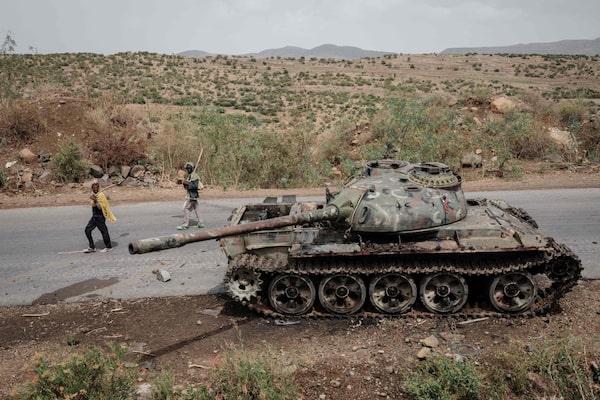
Local farmers walk next to an abandoned tank allegedly belonging to the Eritrean army in Dansa, Ethiopia, on June 20, 2021.YASUYOSHI CHIBA/AFP/Getty Images
An outbreak of heavy fighting in northern Ethiopia has shattered a five-month ceasefire in the region, jeopardizing a fragile diplomatic process that had led to the first peace negotiations between the Ethiopian and Tigrayan governments.
Both sides confirmed that military clashes had erupted on Wednesday morning, with each blaming each other for launching the latest attacks. Tigrayan officials in recent days had reported Ethiopian troop movements in border areas, warning that Ethiopia was planning a military offensive.
Heavy weapon fire and artillery shelling was reportedly heard on Wednesday around the town of Kobo, in the Amhara region near Tigray’s southern border. In a separate incident, the Ethiopian military said it had shot down an airplane bringing weapons to Tigray from neighbouring Sudan – a claim denied by Tigrayan officials.
The United Nations reported that Tigrayan forces on Wednesday had “forcibly entered” a UN warehouse in the Tigrayan capital, Mekelle, and had taken 12 tankers containing 570,000 litres of fuel that were intended solely for the transport of humanitarian aid.
Tigray’s government has been fighting for autonomy from Ethiopia for the past two years. The war began in November, 2020, after Ethiopia sent soldiers into the region. Researchers have estimated that as many as 500,000 people have died from violence and hunger caused by the conflict, including an Ethiopian blockade that has restricted the flow of humanitarian aid to Tigray.
In a statement, the Tigrayan military said an “extensive offensive” was launched by a coalition of Ethiopian soldiers and allied Amhara militias on the southern front of the conflict at 5 a.m. on Wednesday. It called the attacks a “flagrant violation of the cessation of hostilities agreement,” which had been in effect since March.
The Tigrayan statement said the southern attack was intended to divert attention from Ethiopia’s plans for a larger assault from Western Tigray, which is now largely occupied by Ethiopian and Amhara forces. It threatened to launch a counteroffensive beyond the southern front if Ethiopia did not halt the attacks.
The Ethiopian government, in its own statement, said the Tigrayan forces had provoked the fighting by launching attacks at 5 a.m. on Wednesday. It said the “extreme belligerent behaviour” of the Tigrayan military had damaged the peace process and “will be devastating for peace and security in the entire Horn of Africa.”
Independent confirmation of the causes of the fighting was difficult, since Ethiopia has banned journalists and imposed restrictions on telecommunications and internet services in Tigray.
UN Secretary-General Antonio Guterres said he was “deeply shocked and saddened” by the resumption of fighting. Officials of the African Union and European Union said they were gravely concerned and called for a defusing of the conflict.
Western governments have been pushing for peace negotiations for months. Early this month, Ethiopia permitted a delegation of Western diplomats to visit Tigray for the first time. Prime Minister Justin Trudeau is among Western leaders who have repeatedly phoned Ethiopian Prime Minister Abiy Ahmed to seek peace in the region.
Ethiopian and Tigrayan officials held peace negotiations in two secret meetings in Djibouti and Seychelles in recent weeks, their first face-to-face talks since the war began, according to a Tigrayan government statement this week.
The statement accused Ethiopia and its military ally, Eritrea, of “beating the drums of war and mobilizing a coalition of destruction.” It said the lifting of the Ethiopian blockade on Tigray was a non-negotiable condition for peace. It also rejected the Ethiopian demand for mediation by the African Union, saying that the AU had shown that it was not neutral.
William Davison, an Ethiopia expert at the International Crisis Group, an independent research organization, said the latest outbreak of fighting was a “deafening warning” to the AU and Western governments that they must ensure the belligerents drop their preconditions and begin a process of formal peace talks.
“In recent weeks, positions hardened, with Tigray’s leaders insisting on the return of Western Tigray prior to talks, and the federal [Ethiopian] government reneging on its June pledge to restore services such as banking and telecoms before negotiations,” Mr. Davison said in a tweet on Wednesday.
The head of the World Health Organization, Tedros Adhanom Ghebreyesus, said last week that the situation in Tigray is “the worst disaster on Earth” and a “man-made catastrophe.”
The Ethiopian blockade of Tigray was a “siege” of “unimaginable cruelty,” he told a briefing in Geneva.
“Nowhere in the world you would see this level of cruelty, where it’s a government [that] punishes six million of its people for more than 21 months,” said Dr. Tedros, who is himself a Tigrayan. He added that the world seemed to be ignoring the war for racial reasons.
“I haven’t heard in the last few months any head of state talking about the Tigray situation anywhere in the developed world. … Maybe the reason is the colour of the skin of the people in Tigray.”
Because of the blockade, only one-fifth of the fuel needed for humanitarian-relief operations has reached Tigray over the past five months, and almost half of its population is in “severe” need of food, according to UN estimates.
Ethiopian Canadians for Peace, a group consisting largely of Tigrayans in Canada, said the Trudeau government should provide as much attention to Tigray as it does to Ukraine.
“The continued siege of the state of Tigray is a war crime,” it said on Wednesday.
Our Morning Update and Evening Update newsletters are written by Globe editors, giving you a concise summary of the day’s most important headlines. Sign up today.
 Geoffrey York
Geoffrey York